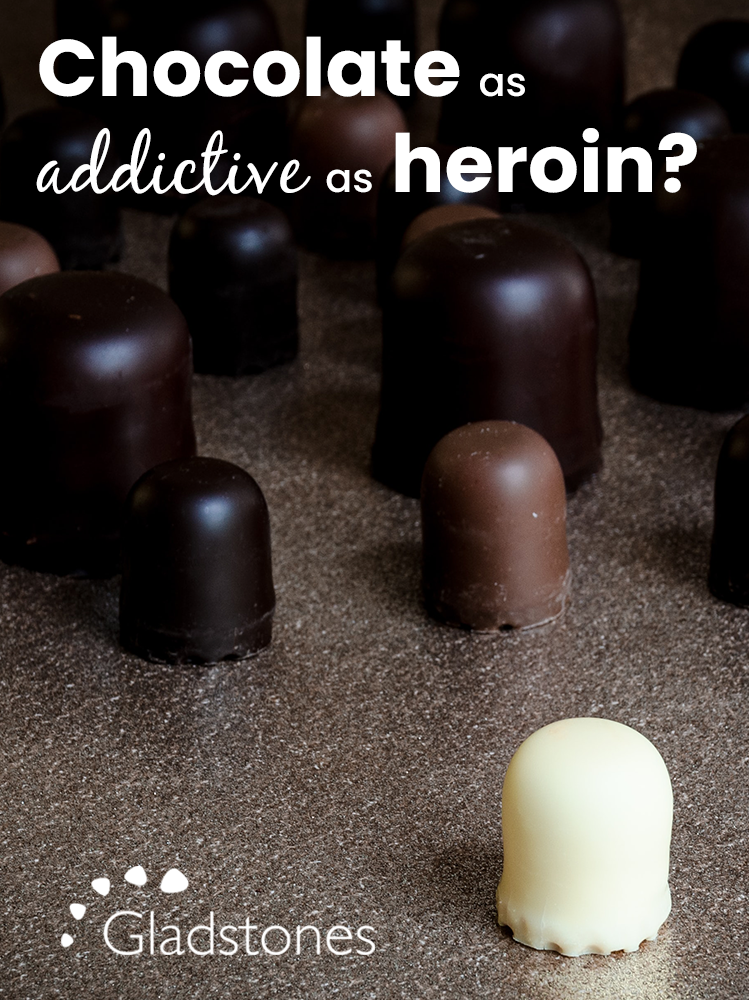Multiple studies find that typical sweets like chocolate or cookies can be as addictive as cocaine or morphine. So is chocolate the gift that keeps on giving or is it merely hysteria?
A university of Michigan study found that chocolate locks a rodent’s brain into an addictive cycle of addiction, joy and despair, much like other addictive drugs. Rats fed M&Ms produced a naturally occurring opioid-receptor binding compound called enkephalin which binds to similar reward pathways in the neostriatum area of the brain as opiates like heroin. The neostriatum region is linked to food and drug addiction in humans. When these same rats were given an opioid injection to this area of the brain, they proceeded to eat double the amount of M&Ms as previously. Even exposing a human food or drug addict test subject to photographs of their desired “fix” will stimulate the neostriatum, so this particular study shows a strong correlation between addiction and the enkephalin receptor site to be valid.
Another non-invasive “maze” study conducted by Connecticut College revealed that rats chose the cookie side of the maze as often as they chose the cocaine side. Later when the researchers “used immunohistochemistry to measure the expression of a protein called c-Fos, a marker of neuronal activation, in the brain’s ‘pleasure center,’” they discovered that “the Oreos activated significantly more neurons than cocaine or morphine.”
Researchers at the University of Tampere in Finland found that people who identified themselves as chocolate addicts salivated more profusely when exposed to chocolate, as well as showing elevated levels of anxiety.
Chocolate undoubtedly contains biologically active ingredients that have the potential to stimulate behaviours and psychological sensations similar to other addictive substances. It must be pointed out however that so does broccoli. In fact broccoli possesses these chemicals in higher concentrations than chocolate and few people, if any, would claim an addiction to broccoli. This would suggest that smell, texture, taste and possibly other cultural phenomenon, together with hormonal and mood swings play an important role in chocolate cravings.
A balanced view of the whole nature vs nurture and how it relates to chocolate cravings would take a holistic view. Massive advertising budgets and glossy chocolate displays compete with size zero expectations and swirl around in a world full of the stresses of modern living. We seek comfort, often in the form of food, then punish ourselves with restrictive diets and administer lashings of guilt when we fail to achieve our perception of perfection. To make matters worse, when we restrain our inner chocolate cravings before we are satisfied we inadvertently increase our desire for more chocolate, creating a viscous cycle of reward and guilt.
Top 10 tips to control chocolate cravings
- Replace chocolate with healthy snacks. Eat less more frequently to balance out blood sugar levels.
- Avoid those “trigger events” that you naturally associate with consuming sugar/chocolate.
- Cut back on coffee. The crash is inevitable and will require yet another “pick me up”.
- Identify whether your cravings are actually related to emotional/comfort/self-esteem issues and take action accordingly.
- Avoid boredom. Go for a walk, call a friend or read a book to take your mind off cravings.
- Increase exercise levels to burn calories and release helpful endorphins.
- Apply a ten minute rule to satisfying cravings. Give yourself ten minutes to come up with a better plan.
- Avoid the food/consumption/guilt/over consumption wheel of pain. If you blow your plan the worst thing you can do is to eat another tub of ice cream as punishment. You already know how that ends.
- Ban chocolate from the house if necessary.
- Explore the world of natural healthy treats like yogurt and honey. Get a recipe book and get inspired!
References:
- Research Shows Cocaine And Heroin Are Less Addictive Than Oreos
- Is Chocolate as Addictive as Heroin?
- Control Your Cravings for Good
- The Peril of Palatability
- Photo by Maciej Gerszewski on Unsplash
If you need to speak to someone right now for a confidential chat call us at Gladstones
Freephone on 0808 258 2350 or email – help@gladstonesclinic.com






